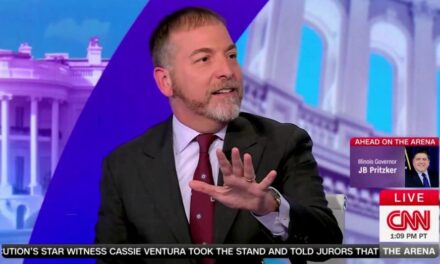In a heated segment that has garnered significant attention, a former Trump administration official engaged in a debate with a CBS host over the role of artificial intelligence in shaping the United States’ tariff policies. The discussion, which unfolded on national television, brought to light various issues surrounding technology’s influence on policy-making, particularly in the context of trade.
The CBS host, known for probing interviews and challenging conversations, initiated the discussion by asking the former official point-blank whether the Trump administration utilized artificial intelligence to inform its tariff decisions. The question was met with a mix of surprise and defense from the ex-official, who adamantly asserted that AI did not play a role in their tariff policy development.
This line of questioning struck a nerve, as it intersected with larger debates regarding the degree to which emerging technologies, like AI, are integrated into governmental decision-making. With global economies becoming increasingly intertwined, the impact of tariffs on both domestic and international markets made the discussion particularly relevant.
The former official emphasized that the administration’s tariff decisions were primarily based on economic data and strategic interests rather than algorithms or machine learning models. He argued that human expertise and traditional economic analysis were fundamental in shaping such sensitive aspects of policy and that attributing these decisions to AI was misleading.
The CBS host, however, pressed on, pointing out the growing trend among businesses and governments alike to leverage AI for data analysis and decision support. The implication was clear: if companies are increasingly using AI for commercial strategy, shouldn’t government be adopting similar approaches for policy innovation?
This line of reasoning raised complex questions about the intersection of technology and governance. As businesses utilize AI to navigate financial landscapes, the suggestion that leaders in government could or should employ similar technologies was a pivotal part of the dialogue. The CBS host used this moment to highlight how innovation can potentially lead to more informed decision-making in an increasingly complex global landscape.
The former official maintained that while AI and advanced data analysis undoubtedly hold potential, the political and economic stakes inherent in tariff decisions require human oversight. He argued that the nuances of international relations, combined with the societal impacts of trade policies, necessitate a level of human judgment that AI simply cannot mimic.
This discourse is particularly salient in light of recent debates surrounding trade policies. The U.S.-China trade tensions significantly shaped recent history, and policies surrounding tariffs have become a contentious topic in political conversations. As legislators and policymakers explore paths forward, the implications of both human-driven and technology-driven decision frameworks will likely continue to be a focal point.
Moreover, the conversation reflects broader concerns about trust in technology. Many Americans remain skeptical about the influence of algorithms and automated systems in critical decision-making processes. This sentiment raises questions about transparency, accountability, and public trust — essential components of effective governance that could be jeopardized by reliance on impersonal systems.
The dialogue also touched on the evolution of trade policy in the digital era. There is an increasing acknowledgment that technology has vastly transformed the ways in which trade operates. Companies now have access to massive data sets that can forecast trends, identify customer preferences, and even predict market fluctuations. To navigate tariffs effectively in such a landscape, the traditional methods of understanding trade dynamics may need to evolve.
As the exchange unfolded, it became clear that there is a generational divide on views toward technology and its application in public service. Younger generations, having grown up in a digital world, are more familiar with and trusting of technological innovations. In contrast, older generations — or those who have held positions of power in traditional structures — may be more cautious, advocating for a blend of tradition and innovation without fully ceding authority to machines.
As the former official continued to articulate the administration’s stance, it became apparent that the debate was also about legacy. The Trump administration’s policies surrounding tariffs and trade are viewed by some as both integral to their economic philosophy and divisive in terms of public opinion. The need for transparency in policy decisions is paramount, and whether AI could mitigate bias or enhance decision-making is a question that is likely to linger for a long time.
Looking forward, the broader discourse from this contentious CBS segment may serve as a microcosm for future discussions regarding technology and governance. While the use of AI in governmental policy may still be more theoretical than practical in many cases, the continued integration of technology in various sectors suggests a future where these discussions may become increasingly common.
The implications of integrating AI into trade policies also go beyond partisan lines. They bring to the forefront challenges related to ethics and accountability. It is vital that any ongoing conversations concerning the use of AI at the governmental level emphasize not just the potential for better decision-making, but also the moral responsibilities that come with such powerful technologies.
Finally, this incident raises significant questions about resistance to change, the potential for a culture clash between traditionalists and technologists, and the ability of the political system to adapt to new realities. As policymakers navigate an evolving landscape of technology and global competition, the outcomes of such debates will shape the future of trade policy in the U.S.
The future use or non-use of AI in government remains to be seen, but with the growing momentum of technology in virtually every area of life, it’s likely that discussions will evolve, and possibly expand, into other sectors beyond trade, as the government grapples with the complexities of modern governance.
Ultimately, this exchange highlights an essential ongoing dialogue in American policymaking: As we forge ahead in the face of rapid technological advancement, how do we balance human expertise with the efficiencies and insights that AI can potentially offer? The answer may not be clear yet, but the conversation around it has certainly begun.
































